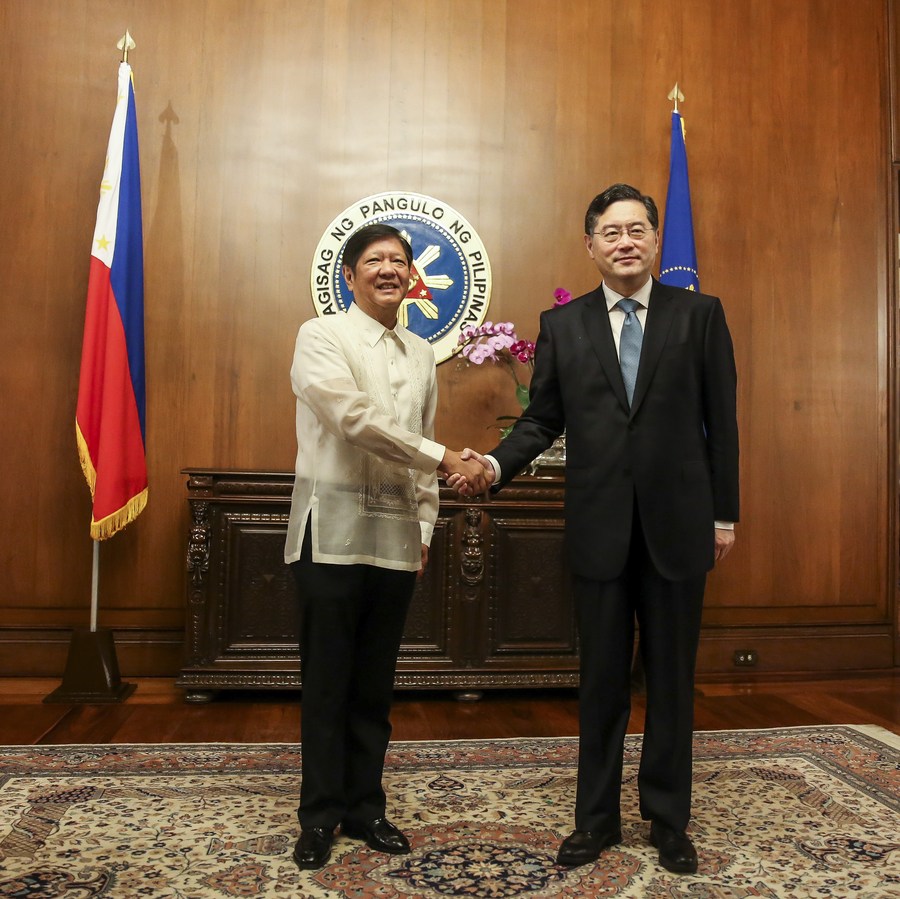Foreign Minister Qin's Manila trip reinforces pragmatic approach
- By Hannan R. Hussain
 0 Comment(s)
0 Comment(s) Print
Print E-mail China.org.cn, April 28, 2023
E-mail China.org.cn, April 28, 2023

Philippine President Ferdinand Romualdez Marcos (L) meets with Chinese State Councilor and Foreign Minister Qin Gang in Manila, the Philippines, on April 22, 2023. [Photo/Xinhua]
Chinese State Councilor and Foreign Minister Qin Gang recently concluded a successful three-day visit to the Philippines, where he met with President Ferdinand Romualdez Marcos Jr. and held talks with Foreign Minister Enrique Manalo. A clear focus on consolidating mutual trust, and managing maritime differences effectively, contrasts with external irritants and reinforces the relationship's value in a fast-changing regional security environment. Above all, such understandings can contribute meaningfully to the sound and steady development of relations.
There is strong merit to Qin's view that good neighborly relations can be bolstered on the back of the landmark presidential consensus between the two countries' leaders in January. It is a fact that Manila and Beijing have repeatedly recognized the value of complying with each other's core national and sovereign interests, making it pertinent to follow "the trend of history" and strengthen such alignment on all fronts. It is here that the establishment of more direct lines of communication and the proposed advancement of a "sea-related liaison mechanism" stand to deepen bilateral trust in the maritime space as some undue external pressures gather steam.
Qin's visit also reaffirmed the importance of compliance on issues of strict internal significance. One of the mainstays of this historic relationship has been continued responsiveness to each other's sovereign and territorial integrity, putting the spotlight on attending to China's "legitimate concerns" and Beijing's hope that Manila would "properly handle Taiwan-related and maritime issues" for regional peace and stability. It is a powerful testament to the relationship's endurance, given Manila's firm reaffirmation of the one-China principle and its continued treatment of the Taiwan question as China's internal affair.
Interestingly, a pertinent focus on upholding strategic independence is another welcome consideration for dialing up maritime cooperation in Southeast Asia. Recall that such a sense of strategic autonomy has contributed to key regional prospects, including advancing a China-ASEAN South China Sea Code of Conduct (COC). Similarly, strategic independence has contributed meaningfully to their view that maritime issues do not comprise the sum total of bilateral relations.
As such, optimism about strengthening strategic independence remains high. It is evidenced by Foreign Minister Manalo's view that negotiable differences should not "prevent [China and the Philippines] from seeking ways of managing them effectively." Moreover, consultations and friendly diplomacy can continue to play a valuable role in resolving present and future maritime issues as the regional environment evolves. "The Philippines will stick to strategic independence rather than picking sides and is ready to deepen friendship, expand cooperation, and strengthen communication with China," Marcos Jr. told Qin. Beijing and Manila's demonstrated support for bolstering common-ground fares well for regional peace.
This trip was Qin's first as foreign minister to the Philippines, underscoring the value China attaches to its relations with Manila. The trip should also be remembered for furthering key elements of the joint communique between the two countries in January. For instance, there was an important consensus on leveraging new communication channels to aid the resolution of future maritime developments. Such prospects align with the "confidence-building measures" proposed by their heads of state to improve mutual trust and benefit maritime stability.
Since 2018, frequent high-level engagements of this kind have reflected positively on the spirit of their comprehensive strategic cooperation. Qin's visit should be seen as the latest investment in that strategic cooperation, given Manila's stated intent to take ties to "even greater heights" by focusing on their comprehensive strategic partnership. Burgeoning bilateral trade, as well as expanding spheres of multisector cooperation, collectively indicate huge potential to drive forward "win-win cooperation" that serves "the fundamental interests of both sides."
In sum, Qin's debut trip to the Philippines as foreign minister was instrumental in consolidating mutual trust, generating new understandings of maritime cooperation, and ensuring that the fundamentals of the relationship inform steady and sound development for the future.
Hannan R. Hussain is a foreign affairs commentator, author and recipient of the Fulbright Award.
Opinion articles reflect the views of their authors, not necessarily those of China.org.cn.
If you would like to contribute, please contact us at opinion@china.org.cn.





